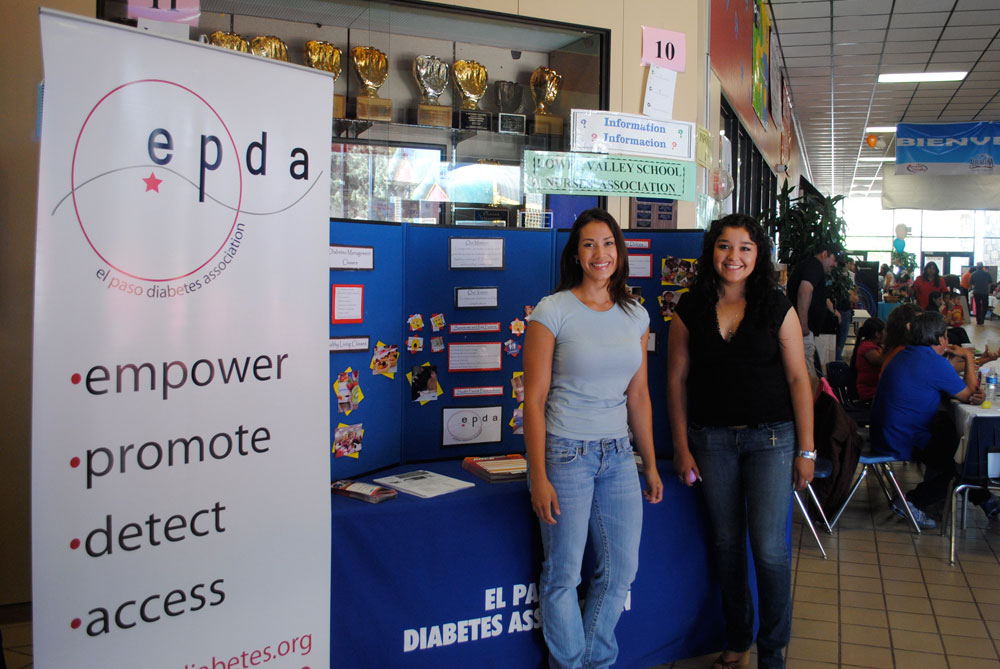EL PASO — Health is an issue people push aside until it finally becomes an issue and the main health issue in this border city is diabetes.
El Paso has long been considered one of the unhealthiest cities in the entire country, ranking as high as number one in obesity by Men’s Fitness magazine in 2009. Diabetes is at the forefront of chronic ailments here and obesity is one of many risk factors for this disease.
Ethnicity also plays a role. Hispanics, Native Americans, African Americans, Pacific Islanders and Asian Americans are at higher risk. And El Paso is 82 percent Hispanic.
Data provided by El Paso Diabetes Association (EPDA) shows that more than 85,000 persons in El Paso are stricken with diabetes and as many as 25 percent of them don’t know they have it. Type 2 affects 90 percent of all diabetics in El Paso.
Diabetes is a chronic lifelong illness that occurs when there are high levels of sugar in the blood. There are three types of diabetes — types 1, 2 and gestational diabetes.

UTEP Students Cynthia Chavez and Estrella Pena doing volunteer work for EPDA at the Lower Valley Health Fair, April 16, 2011. (Daniel Ornelas/Borderzine.com)
Type 1 is also known as juvenile diabetes. This type manifests itself when the pancreas fails to produce insulin. Gestational diabetes affects women during pregnancy and type 2, the most common form, is most often triggered by obesity and stress.
Maintaining a good and balanced diet along with exercise and medication is the only way to control this disease.
Risk factors vary with individuals and include a family history of diabetes, being overweight or over the age of 40. Also at risk are women who have given birth to a baby weighing more than nine pounds or who were diagnosed with gestational diabetes. If diabetes is not controlled properly it can lead to complications such as blindness, kidney failure, heart disease, stroke and even amputation of limbs.
Carmen Enriquez a diabetes educator with EPDA, an independent non-profit organization, says their mission is to empower diabetics. “Our mission here at the El Paso Diabetes Association is to eliminate diabetes and its complications through empowerment, promotion, detection and access.”
EPDA organizes several community events to get people more involved with the organization, to raise awareness, promote their services and help people control the disease. The Diabetes Walk/Run helps raise money for the organization every year.

Carmen Enriques, diabetes educator. (Daniel Ornelas/Borderzine.com)
It also hosts events that target a much younger population. This year their 24th annual Camp Lydia-Mann started June 27 and runs through July 1. This event is for children ages five to 12 years of age and it helps those affected with diabetes or pre-diabetes.
Social media has become a very efficient way to reach the community, especially the younger population of El Paso. EPDA diabetes educator, Henry Brutus said their Facebook page has helped the organization’s outreach. “Our Facebook page was created to leverage the power of social media with traditional media and to expose the El Paso Diabetes Association to a younger and wider audience. The response has been phenomenal. In six months, we have more than 5,000 fans/friends and receive 10 to 20 comments and private messages after every post.”
These efforts have helped bring more people to events that are hosted by EPDA. “Last year, we had 400 walkers participate as a result of Facebook. Facebook has helped the EPDA continue its message of hope in the diabetic community,” Brutus added.
For more information on El Paso Diabetes Association programs visit www.epdiabetes.org or call (915) 532-6280.


I just read Dr. Know’s blog post that talks about a new study that showed a very low calorie diet actually reversed type 2 diabetes. Really cool stuff…if you can handle an extreme diet like that.
http://www.knowguff.com/2011/06/low-calorie-diet-reverses-type-2.html